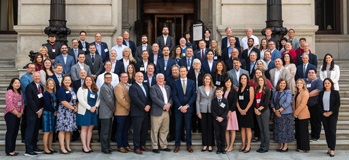Fall 2025
Features
Pennsylvania Act 27 Modernizes CPA Licensure and Opens New Pathways into Accounting
By Jennifer Cryder, CPA
The accounting profession has changed over the past decade, and the rules governing entry into the profession were in dire need of an update. This feature highlights PICPA's successful efforts achieved by the recent passage of Act 27.
Pillar 2 Rules and What They Mean for International Businesses
By Andrew M. Bernard Jr., CPA, MST, Adam Packer, JD, LLM, Mark Klitgaard, JD, LLM
The Organisation for Economic Cooperation and Development’s Pillar 2 establishes a global minimum tax and mechanisms for implementation. Although the United States has indicated it will not join the global tax deal, foreign-based multinational companies with U.S. subsidiaries will still have to contend with Pillar 2.
CPAs Are Built for Cybersecurity and SOC Assurance
By John Ruddy, CPA, CFA, DPS, and Ashley Stampone, CPA, PhD
Cybersecurity is often thought to be the exclusive domain of information technology professionals, but CPAs possess a unique blend of skills that make the profession ideal for cybersecurity risk management and System and Organization Control (SOC) reporting.
Columns

Accounting & Assurance
Private Company CECL Practical Expedients
By James J. Newhard, CPA
The Private Company Council (PCC) has been working on a practical expedient to help reduce the complexities of applying current expected credit losses (CECL) for private companies. This column examines where PCC’s efforts currently stand.

Education
Tackling the Pipeline Issue on Campus and in the Classroom
By Jennifer Waldo, DBA, and Keith B. Bittel, CPA
For years, the data on accounting enrollments at college were pretty grim. But over the past three academic years, Westminster College’s finance program has undergone meaningful transformation aimed at enhancing academic rigor, improving student outcomes, and aligning with industry expectations. Find out how Westminster made certain changes and embraced new partnerships to achieve success.

Legislative News
Voices Carry: Member Involvement Leads to Legislative Victory
By Peter N. Calcara
The passage of Act 27 in Harrisburg this past summer was a blazing-fast success story for the PICPA and the CPA profession in Pennsylvania. This column explains how it was all possible. Hint: It was you.

State & Local Tax
State and Local Tax Considerations during M&A Diligence
By Matthew D. Melinson, CPA, Rob Michaelis, CPA, JD, Narj Bhogal, CPA, and Daniel Thomas, JD
When it comes to merger and acquisition diligence, there are numerous state and local tax considerations. This column highlights some of the more complex issues that have arisen in recent years due to how companies now transact business and the state law changes that have occurred to keep pace.

Business & Industry
Is the “Strategic CFO” Beyond Our Grasp?
By James J. Caruso, CPA (Inactive)
The typical middle market CFO job description is likely to call for strategic thinking and insight, yet it is just as likely to simultaneously call for a “hands-on CFO.” One has to wonder if this duality is making the conceptual aspiration of the “strategic CFO” even possible for most.

Careers & Lifestyles
From Job Search to Leadership: Networking Gets You There
By Jim DeLuccia
Whether you are wondering how to find a new job, how to win new business, or how to become a community leader, the answer is the same: networking. A network is the foundation of a successful career and fulfilling life, but successful networking demands intention and attention.

Federal Tax
Partial Bad Debts: An Opportunity Hiding in Plain Sight
By James P. Swanick, CPA, and Michael J. Tighe, CPA
When a customer or debtor fails to pay a liability, a business may need to write off the unpaid amount as bad debt. However, it is not an “all or nothing” proposition. Understanding how to properly manage partially worthless bad debts may offer tax relief both in the character and timing of a deduction and minimize the overall loss.

Practitioners
Elevating the Client Experience in Accounting Advisory
By Dan Owens, CPA, and Jonathan Hernandez, CPA
Accounting advisory firms play a critical role in guiding businesses through complex financial journeys. However, many clients report dissatisfaction with the overall experience. This column shares the key components of service delivery that contribute to an outstanding client experience.

Emerging CPAs
Tech Fluency Is Career Currency: Plan Digital Upskilling Early
By Jacob Crowley
As employers adapt to automation, artificial intelligence, and advanced analytics, they’re not just asking, “Can this person do the job?” This column explains how the ability to understand, communicate, and leverage technology can directly influence your effectiveness and prospects.

Liability Lessons
Use of AI Comes with Professional Liability Risk
By Jonathan S. Ziss, JD
The use of artificial intelligence (AI) by CPAs not only automates tedious tasks, but its generative capabilities also can understand patterns, find and examine anomalies, and provide insights. But the use of AI at work inevitably comes with added professional liability risk.

Ethics
Building an Ethical Culture through Leadership
By Heather Kuhns, DBA, and Mark Koscinski, CPA, DLitt
Maintaining trust with the public, employees, and other stakeholders is crucial to demonstrating the overall vitality of your firm and its operations. One way to do this is to adopt a culture that sets integrity and responsible decision-making as top priorities.

Personal Financial Planning
New Rules for Qualified Small Business Stock Gain Exclusions
By Brian M. Balduzzi, JD, LLM (Taxation), CFP
The One Big Beautiful Bill Act that was passed by Congress this past summer substantially amended IRC Section 1202, potentially allowing more founders and investors to qualify for income tax exclusion upon the sale or exchange of their holdings.




